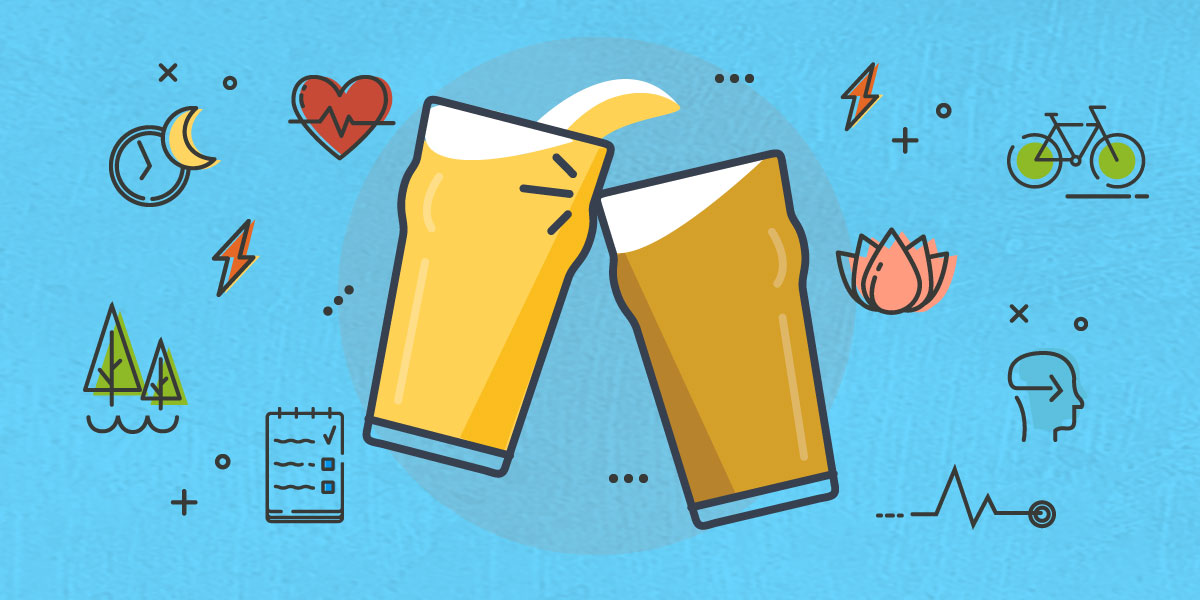After a long day, nothing tastes better than a fresh craft beer or two. But a recent studyOpens in new window that recommends healthy drinking is only five beers a week—from 14 per week for men and seven per week for women – might spark concern over what, exactly, is moderate drinking and how healthy it really is.
[newsletter_signup_box]
The good news is, there still are documented health benefits related to drinking beer. Here is a rundown on how beer can be a healthy beverage when enjoyed responsibly and reasonably.
Beer & Your Brain Health
If you think that gose in your glass makes you feel better, you’re absolutely right. Many studies have backed the belief that beer (and all alcohol) can help you relax after a long day. But you didn’t need a study for that!
The benefit, however, goes way beyond lifting your spirits. Studies have pointed to beer, more so than wine or spirits, as being a boon for your brain.
(MORE: Tea Beers Takeover for Spring)
One reason: the form of silicon found in beer is available for our bodies to metabolize. Plentiful in grains, green beans and beer (thanks to the grains), silicon helps protect your brain from compoundsOpens in new window thought to eventually cause cognitive diseases, according to a 2013 study. Additionally, a Chinese studyOpens in new window points to a compound found in hops, xanthohumol, that supports neuronal cells and could help fend off brain disorders like Alzheimer’s disease, Parkinson’s disease and dementia.
Plus, beer could promote brain power and creativity. In a study published in the journal “Consciousness and Cognition,” researchers got their test subjects tipsy and asked them solve a battery of puzzles. The people with a beer buzz solved the puzzles faster than their sober counterparts. In fact, alcohol made the test subjects almost 30 percent more likely to find the unexpected solution to the puzzles.
Beer & Your Bones Health
Silicon, which is found in beer, but not wine or spirits, is the star again. A review published in the International Journal of EndocrinologyOpens in new window found that beer is a rich source of silicon—one of the building blocks of bones.
In the study, which mentions beer specifically, along with grains and green beans, silicon in the diet is singled out for its potential role in the prevention and treatment of osteoporosis, especially post-menopausal loss of bone in women.
Speaking of “the change,” hops in beer are rich in phytoestrogens. These natural sources of the female-dominate hormone estrogen, are touted to help women through that stage of lifeOpens in new window.
(READ: Untold Stories from Craft Beer FoundersOpens in new window)
Beer & Your Heart Health
Red wine has long been the darling of the medical world for heart health. Since the 1980s, nutritionists and doctors alike have touted wine, particularly red wine, as being a friend to your cardiovascular system. Thanks to what researchers at the time called the French Paradox –a catchphrase used to describe the lower rates of heart disease in France, despite a diet rich in dietary cholesterol and saturated fat—wine was linked to a lower risk of heart attack, stroke and death from heart disease. But it turns out wine just had a better PR firm than beer or spiritsOpens in new window.
Several studies, including one published in the American Journal of the Medical Sciences, have since pointed to ethanol, the alcohol in beer, wine and spirits, as being linked to lower incidents of cardiovascular disease. Further, that study suggested that “from a nutritional standpoint, beer contains more protein and B vitamins than wine.” Bonus nutrients? That’s worthy of a toast.
But there’s more: A preliminary study presented at the American Heart Association Scientific Sessions 2016Opens in new window followed 80,000 participants for six years and found that moderate drinkers had the slowest decline in high-density lipoprotein (HDL), or “good” cholesterol, levels — and in turn, a lower risk of cardiovascular diseases. Research also shows that of men who have already suffered a heart attack, those that drank beer moderately (up to two drinks per day) were 42 percent less likely to die of heart disease.
A 2012 study’s published resultsOpens in new window, indicated that the ethanol in beer, wine and spirits prevents plaque from sticking to your arteries, which, in turn, prevents heart attacks. So take that to, well, heart, when you pop open your next craft beer.
(READ: Can Craft Brewers Save the Verde River?)
Beer & Your Eye Health
All jokes about beer goggles aside, a beer a day could keep the optometrist away. Canadian researchersOpens in new window found that one daily beer—especially a stout or other darker beers—decreases the chance of cataracts forming in your eyes by upwards of 50 percent. There’s a tipping point, though. Drinking three or more beers a day increases the risk of cataracts.
Beer & Prevention
 Numerous studies link moderate beer drinking to the prevention of different ailments. Instead of an ounce of prevention, perhaps it’s a pint of prevention. Here are a couple of findings:
Numerous studies link moderate beer drinking to the prevention of different ailments. Instead of an ounce of prevention, perhaps it’s a pint of prevention. Here are a couple of findings:
Researchers in Finland discovered that beer can help prevent kidney stonesOpens in new window. The study concluded that “beer consumption was inversely associated with risk of kidney stones; each bottle of beer consumed per day was estimated to reduce risk by 40 percent.”
Wine and spirits also prevented kidney stones, but not as significantly as beer, according to the study. And other drinks like fruit juice and sugary sodas (not diet soda) contributed to kidney stones.
(VISIT: Find a U.S. Brewery)
Keep this in mind come the next cold and flu season: a study by Oregon Health & Science University points to moderate alcohol consumption as an immunity boosterOpens in new window. In the study, monkeys were split into two groups. One group was allowed to have moderate alcohol consumption and the other group was given sugar water. The moderate drinkers showed a better immune response. So maybe an apple a day isn’t the only thing that keeps the doctor away!
Of course, the key here is drinking beer in moderation— “more is better” doesn’t work. In fact, most studies point to a decrease in beer’s purported health benefits if too much is consumed. So, cheers to your health and to enjoying great beer as a healthy pursuit!
CraftBeer.com is fully dedicated to small and independent U.S. breweries. We are published by the Brewers Association, the not-for-profit trade group dedicated to promoting and protecting America’s small and independent craft brewers. Stories and opinions shared on CraftBeer.com do not imply endorsement by or positions taken by the Brewers Association or its members.


Share Post